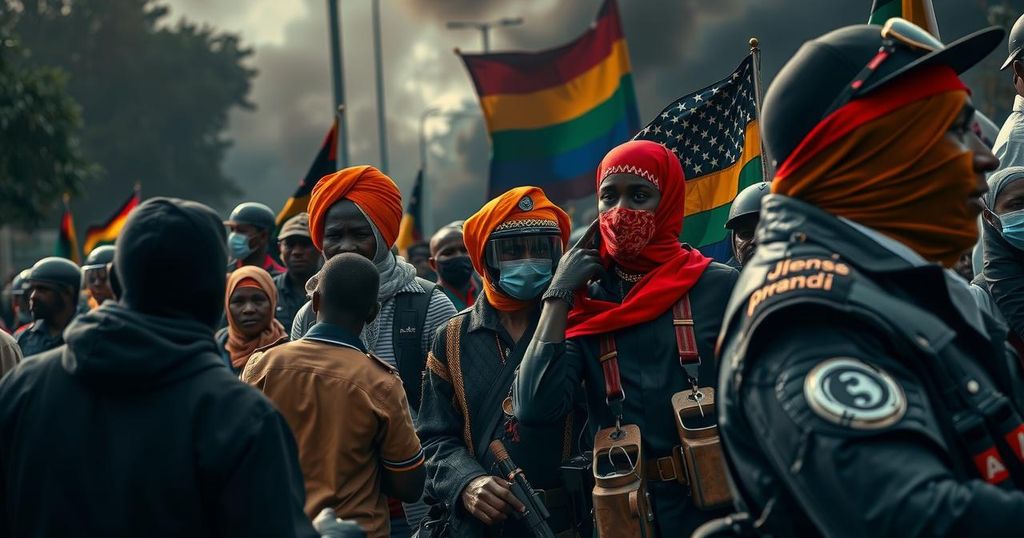Political Crackdowns in Uganda and Zimbabwe Heighten Fears for Democracy

In Uganda and Zimbabwe, governments are intensifying crackdowns on opposition and human rights advocates, raising alarm over the state of democracy. Uganda’s harsh Anti-Homosexuality Act enacts severe consequences for LGBTQ+ individuals and activists, while Zimbabwe sees similar oppression with the detention of opposition leaders. International responses are mixed, with urgent calls for justice and accountability resonating among citizens facing increasing repression.
The political situations in Uganda and Zimbabwe are increasingly alarming, as both governments intensify their crackdowns on opposition figures and human rights advocates, heavily jeopardizing the prospects for democracy and civil liberties. In Uganda, the implementation of the 2023 Anti-Homosexuality Act has raised significant international concern. Enforced by the Ugandan Constitutional Court, this law prescribes extreme penalties for homosexuality, including the potential for life imprisonment, and categorizes some acts as “aggravated homosexuality,” subject to the death penalty. Health and human rights workers are also imminently at risk if they promote discussions regarding homosexuality due to the severe implications of the law.
The international response has been mixed. The World Bank has ceased lending to Uganda while attempting to introduce mitigation measures to uphold human rights; their success, however, remains uncertain. In contrast, the United States has enforced targeted trade sanctions and reallocated healthcare funding to counteract the damaging practices observed in the country. Unfortunately, the European Union’s reaction has been criticized as inadequate, limited to expressions of regret over the potential death penalty rather than firm condemnation, especially when juxtaposed with the direct responses from international corporations like Google and Microsoft, who have markedly stressed the need for economic stability free from discrimination.
Meanwhile, the Ugandan government is reinforcing its authoritarian control as elections loom. Reports indicate a systematic suppression of dissent, exemplified by the abduction of prominent opposition leader Kiiza Besigye by Ugandan intelligence while he was in Kenya, leading to baseless charges against him upon his return. This incident highlights the lengths to which the state may go to silence opposition, underlining the persistent threat to human rights under President Yoweri Museveni.
Analogous repression can be observed in Zimbabwe, where recent developments have emerged surrounding the release of 35 opposition leaders, including Jameson Timba, after protracted detentions on dubious charges tied to an “unlawful assembly”. The charges stemmed from what was purportedly a celebratory gathering for the Day of the African Child, now characterized as an organized attempt to undermine the authority. Amnesty International has criticized these actions as symptomatic of a broader governmental crackdown under President Emmerson Mnangagwa, who is perceived to be following in the oppressive footsteps of former leader Robert Mugabe.
Zimbabwe’s current regime has been accused of mirroring previous oppressive tactics, raising concerns among citizens who fear a return to the political violence of past administrations. This climate of intimidation persists as the nation prepares for elections. The Kenyan government’s response to the abduction of Besigye has been scrutinized, given its implications for regional relations, with suspicions of negligence or complicity towards Uganda’s actions looming.
Moreover, the involvement of Russian influence in Uganda adds another layer of complexity, as Moscow appears to be fostering anti-LGBT sentiment throughout Africa, thereby intensifying existing societal divisions and fueling nationalist agendas. This intricate political landscape poses grave challenges for advocates of democracy and human rights in both countries as governmental crackdowns become the norm.
As Uganda and Zimbabwe approach critical electoral periods, concerns escalate regarding the viability of meaningful change in the political fabric of these nations. Failed international responses focusing on economic benefits over human rights further entrench the regimes’ oppressive structures. The question remains valid: What actions can regional and international stakeholders take without tacitly endorsing these abusive regimes? This urgent call for justice and accountability resonates broadly among citizens desiring genuine democratic reforms.
The political landscape in Uganda and Zimbabwe has been marred by increasing governmental suppression against opposition and human rights advocates. In Uganda, the enactment of the severe 2023 Anti-Homosexuality Act epitomizes the erosion of civil liberties leading to heightened international scrutiny. The Ugandan administration’s aggressive tactics have raised concern regarding their implications for upcoming elections while Zimbabwe mirrors this repression with the detention of opposition leaders and restrictive practices under President Emmerson Mnangagwa’s rule. Together, these situations indicate a troubling trajectory for democracy in both nations.
In summary, the rising oppositional crackdowns in Uganda and Zimbabwe signify a worrying trend that undermines the foundations of democracy. With legislation such as Uganda’s Anti-Homosexuality Act reinforcing state power and suppressing dissent, while Zimbabwe grapples with similar repressive tactics under Mnangagwa, the implications for civil liberties are severe. A thoughtful and vigorous response from international actors is critical to address these abuses and support the urgent call for justice and democratic practices among citizens within these nations.
Original Source: evrimagaci.org






